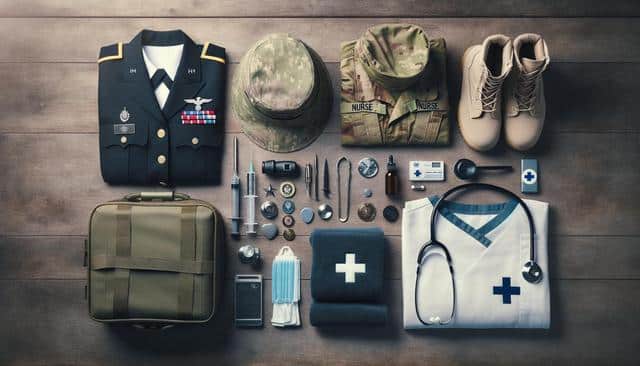
Military Nursing: A Comprehensive Guide to Serving in Healthcare and Defense
Understanding the Role of a Military Nurse
Military nursing is a unique and multifaceted career that blends clinical expertise with the discipline and structure of military service. A military nurse provides medical care to active-duty personnel, veterans, and their families, often in diverse and challenging environments. Whether stationed at a military base, aboard a ship, or deployed in a combat zone, these professionals play a critical role in maintaining the health and readiness of service members. Their duties extend beyond patient care and often include emergency response, humanitarian aid, and support during natural disasters or conflict situations. The role demands not only clinical competence but also adaptability, resilience, and leadership skills.
Military nurses are commissioned officers, which means they also carry leadership responsibilities within their units. This dual role as a healthcare provider and officer requires a strong foundation in both medical science and military protocols. Many enter the field after earning a Bachelor of Science in Nursing (BSN) and passing the NCLEX-RN exam, followed by officer training specific to their branch of service. Once commissioned, ongoing education and training are essential, ensuring nurses stay current with medical advancements and military operational standards.
Training and Educational Pathways
The path to becoming a military nurse typically begins with obtaining a nursing degree from an accredited institution. Many candidates pursue a BSN, though some military branches offer programs that allow for concurrent nursing education and military training. After graduation, aspiring nurses must pass the NCLEX-RN licensing exam to practice as registered nurses. Following licensure, candidates attend officer training to prepare for military service, which includes physical conditioning, leadership development, and instruction in military customs and ethics.
Once in service, military nurses have access to specialized training programs that enhance their clinical skills and broaden their operational readiness. These may include:
- Critical care and trauma courses
- Flight nurse certification
- Combat casualty care training
- Humanitarian and disaster response education
In addition to professional development, many receive support to pursue advanced degrees such as a Master of Science in Nursing (MSN) or Doctor of Nursing Practice (DNP), often with tuition assistance or loan repayment options. This emphasis on continuing education helps military nurses stay effective in complex, rapidly evolving environments.
Daily Life and Work Environment
The daily responsibilities of a military nurse can vary widely based on their current assignment and location. In a hospital setting on a military base, duties may resemble those of civilian nurses, such as administering medications, coordinating patient care, and collaborating with multidisciplinary teams. However, in deployed or field environments, nurses may find themselves working in mobile field hospitals, tents, or aboard ships, managing trauma cases, performing emergency procedures, and stabilizing wounded personnel for evacuation.
Military nurses must be prepared for unpredictable and high-pressure scenarios. Their roles often require them to adapt quickly to new surroundings, cultures, and patient populations. Despite these challenges, many find the work deeply rewarding due to the impact they make on the lives of service members and their families. Teamwork is essential, as is the ability to follow orders and maintain composure under stress. The camaraderie among military medical personnel also fosters a strong sense of purpose and community.
Career Advancement and Opportunities
Military nursing offers structured career progression, with opportunities for advancement through merit and experience. Nurses can rise through the officer ranks, gaining increased responsibility and leadership roles. Promotions are influenced by performance evaluations, additional training, and time in service. As nurses advance, they may take on supervisory roles, manage departments, or even command entire medical units.
There are also options to specialize in areas such as:
- Psychiatric and mental health nursing
- Orthopedic and rehabilitative care
- Public health and preventive medicine
- Emergency and trauma nursing
Deployment opportunities can also enrich a nurse’s professional development. Serving in different locations, including overseas bases or humanitarian missions, provides exposure to varied medical challenges and diverse patient needs. These experiences enhance both clinical and cultural competence, making military nurses well-rounded professionals who are highly regarded both within and outside the military.
Benefits and Challenges of Military Nursing
One of the key advantages of a military nursing career is the comprehensive benefits package. This often includes a competitive salary, housing allowances, healthcare coverage, and retirement plans. Educational incentives such as scholarships, loan repayment, and continuing education support are also significant draws. Additionally, the opportunity to serve one’s country while practicing a vital profession adds a meaningful dimension to the work.
However, military nursing is not without its challenges. Frequent relocations, extended deployments, and the emotional strain of treating critically injured patients can take a toll on personal and professional life. Nurses must be prepared for a lifestyle that demands flexibility, discipline, and emotional resilience. Balancing duty and personal commitments can be difficult, especially during times of conflict or crisis. Nonetheless, many nurses find that the rewards—both tangible and intangible—make the journey worthwhile.
Conclusion: Is Military Nursing Right for You?
Military nursing is more than a job—it’s a calling that combines a passion for healthcare with a commitment to service. For those who thrive in structured environments, seek adventure, and value teamwork, it offers a fulfilling and impactful career path. While the demands are high, the personal and professional growth opportunities are equally significant. By choosing this path, you can make a real difference in the lives of those who protect our nation while building a resilient, respected career in healthcare.